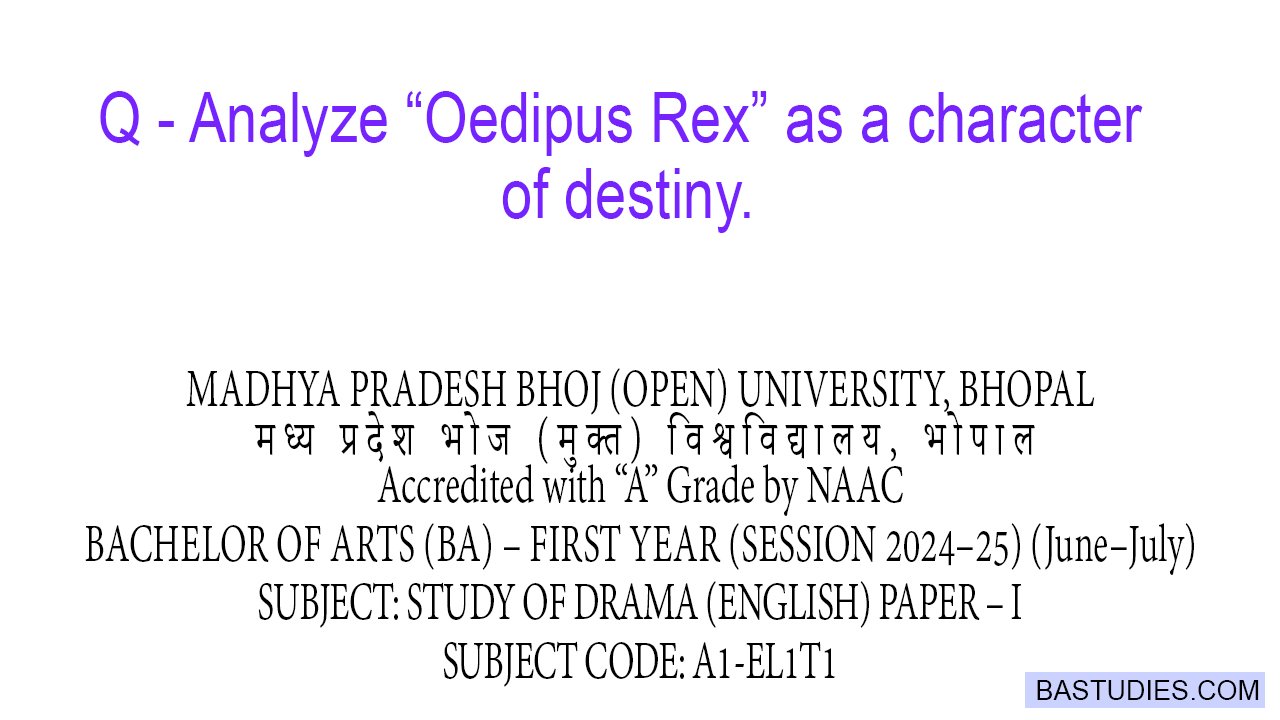Analyze Oedipus Rex as a character of destiny
B.A. First Year – Study of Drama (English), Paper – I.
Q – Analyze Oedipus Rex as a character of destiny
ANSWER –
Oedipus Rex as a Character of Destiny
Introduction
Sophocles’ Oedipus Rex is one of the most powerful Greek tragedies ever written, exploring the tension between fate and free will. The character of Oedipus, the King of Thebes, is often seen as a tragic figure who cannot escape his destiny, no matter how hard he tries. His life is shaped by a prophecy that he would kill his father and marry his mother—a fate he desperately tries to avoid but ultimately fulfills. In this context, Oedipus emerges as a symbol of human struggle against the inevitable power of destiny.
The Power of Prophecy and Fate
From the beginning of the play, destiny governs the entire action. The oracle of Apollo had long ago foretold that Oedipus would murder his father and marry his mother. This prophecy becomes the central force driving the narrative. Although Oedipus tries to escape his fate by leaving Corinth (where he believes his real parents live), his actions ironically bring him closer to fulfilling the prophecy.
The very act of trying to avoid his destiny becomes the reason for its fulfillment. This irony highlights the inescapable power of fate in Greek tragedy. It also shows that human beings, despite their intelligence and intentions, are often powerless against preordained outcomes.
Oedipus as a Man of Action and Reason
Oedipus is not a passive character. He is portrayed as brave, intelligent, and determined. He is known for solving the riddle of the Sphinx and saving Thebes, which earned him the throne and the hand of Queen Jocasta. His greatness lies in his confidence and his commitment to truth. When the play begins, Thebes is suffering from a plague, and Oedipus vows to find the cause and save his people again.
He takes on the role of investigator with energy and sincerity, believing that human reason and determination can solve any problem. However, this quest for truth leads him to the horrifying realization of his own crimes. His very strength becomes his downfall—he digs too deeply into the mystery, not realizing that he is, in fact, the cause of the city’s suffering.
This paradox highlights the tragic irony of Oedipus’s character. He is heroic because he seeks the truth, but it is this very truth that destroys him.
Conflict Between Free Will and Destiny
One of the most important philosophical questions in Oedipus Rex is the conflict between free will and destiny. Oedipus makes several choices: he leaves Corinth to avoid harming his supposed parents, he kills a stranger at a crossroads in a fit of rage, he marries a widowed queen in Thebes. These decisions seem to be made freely, but they all serve the prophecy.
The play suggests that even free will is a part of destiny. The gods do not force Oedipus to make these choices, yet his choices align perfectly with what the prophecy predicts. Sophocles seems to argue that destiny controls human lives not by removing choice, but by making every choice lead to the same destined outcome.
Oedipus’s Tragic Flaws (Hamartia)
Though fate plays a dominant role, Oedipus is also responsible for his downfall through his hamartia (tragic flaw). His main flaws are pride (hubris) and anger. He is overly confident in his intelligence and his ability to overcome any obstacle. He quickly becomes angry when others, like Tiresias or Creon, suggest that he might be part of the problem.
His refusal to heed warnings, his insults toward the prophet Tiresias, and his rash decision to accuse Creon of treason all reflect his inner pride and impulsiveness. These human flaws, combined with the unchangeable prophecy, lead him to ruin.
Recognition (Anagnorisis) and Reversal (Peripeteia)
A key element in Aristotle’s definition of tragedy is anagnorisis, or the moment of recognition, where the hero realizes the truth. For Oedipus, this moment is devastating. He learns that he has unknowingly killed his father, Laius, and married his mother, Jocasta.
This recognition leads to peripeteia, a complete reversal of fortune—from a respected king to a cursed, blind outcast. His suffering evokes pity and fear in the audience, fulfilling the goal of tragedy, which is to produce catharsis—an emotional cleansing.
Symbolism of Blindness and Sight
Throughout the play, sight and blindness are used symbolically. Oedipus can physically see but is blind to the truth of his identity. Conversely, the blind prophet Tiresias sees the truth clearly. When Oedipus finally sees the truth, he blinds himself, choosing physical blindness as a punishment for his metaphorical blindness.
This act signifies his transformation—from ignorance to knowledge, from pride to humility, from a ruler to a human who accepts the limits of power and wisdom.
Conclusion
Oedipus is a tragic figure destined for suffering, not because of divine cruelty, but because of the complex relationship between fate and free will. His intelligence, courage, and desire for truth make him admirable, yet these same qualities lead to his tragic downfall. Sophocles presents Oedipus as a man caught in the web of destiny, unable to escape the fate assigned to him by the gods.
Through the character of Oedipus, the play Oedipus Rex explores deep philosophical questions about human existence, the limits of knowledge, and the power of destiny. Oedipus remains one of the most powerful tragic figures in world literature—a true character of destiny.
READ ALSO – Write a short note on Indian English Drama
READ ALSO – Write a short note on Restoration drama
READ ALSO – Write a short note on Elizabethan Drama
MORE Q&A – STUDY OF DRAMA
